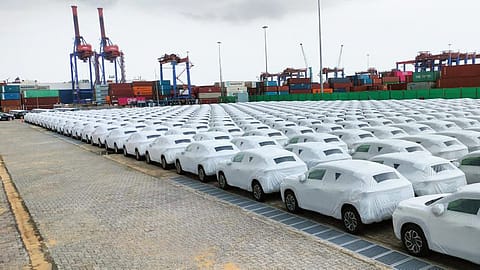Maruti Suzuki begins export of Fronx to Japan
The Fronx is the second model from Maruti Suzuki to be exported to Japan, after Baleno in 2016.

Maruti Suzuki India Limited, India’s leading automobile manufacturer by volumes, today commenced export of its ‘Made-in-India’ Fronx to Japan.
Fronx, which is manufactured at Maruti Suzuki’s Gujarat plant, will be the first SUV from India’s largest carmaker to launch in Japan. The first consignment of over 1,600 vehicles left for Japan from Gujarat’s Pipavav port.
The Fronx is the second model from Maruti Suzuki to be exported to Japan, after Baleno in 2016.
Fronx is planned to be launched in Japan by Suzuki Motor Corporation, Maruti Suzuki’s parent company, in the autumn of 2024.
Maruti Suzuki is India’s largest passenger vehicle exporter. The automaker shipped over 2.8 lakh units to over 100 countries in the financial year 2023-24, clocking 42% share in the exports of passenger vehicles from the country. It exported a record 70,560 units in Q1 FY25, a growth of 11.6% over Q1 FY24.
Recommended Stories
In July 2023, the company commenced export of Fronx to destinations like Latin America, the Middle East, and Africa. Cumulatively since launch, Fronx has recorded total sales of over 2 lakh units in domestic and export markets.
Japan is one of the most quality conscious and advanced automobile markets in the world, says Hisashi Takeuchi, managing director and chief executive officer, Maruti Suzuki India.
(INR CR)
This comes at a time when passenger vehicle wholesales in the domestic market have plunged. PV sales of Maruti Suzuki fell 9.6% year-on-year to 137,463 units in July 2024 compared with 152,126 units in the corresponding month last year.
Net profit of Maruti Suzuki India raced 46.9% year-on-year to ₹3,649 crore for the quarter ended June 30, 2024, compared with ₹2,485 crore in the year-ago period The profit rose broadly on account of cost reduction efforts, favourable commodity prices and foreign exchange. Revenue from operations rose 9.9% to ₹33,875 crore in the first quarter as against ₹32,327 crore in the corresponding quarter last fiscal. India’s largest carmaker by volume sold a total of 521,868 vehicles during the first quarter, higher by 4.8% compared to the same period previous year.
The carmaker is also betting big on CNG-powered cars with 6 lakh units expected to be sold this fiscal. CNG-powered cars are not as clean as hybrids but are better than petrol or diesel vehicles, Maruti Suzuki chairman RC Bhargava said in the company’s annual report for 2023-24. Hybrid cars improve fuel efficiency by about 35% to 45% and help reduce carbon and greenhouse gas emissions by 25% to 35%, he added. “It is also clear that pure petrol and diesel cars are the worst in terms of carbon and greenhouse gas emission and consumption of fuel. Therefore, while electric cars use increases, customers should be encouraged to buy cars using strong hybrid technology, or CNG or ethanol and biogas. Pure petrol and diesel car use should be minimised,” Bhargava said.
About 46% of Maruti Suzuki’s sales come from rural areas, thanks to its largest dealership and service network across the country.